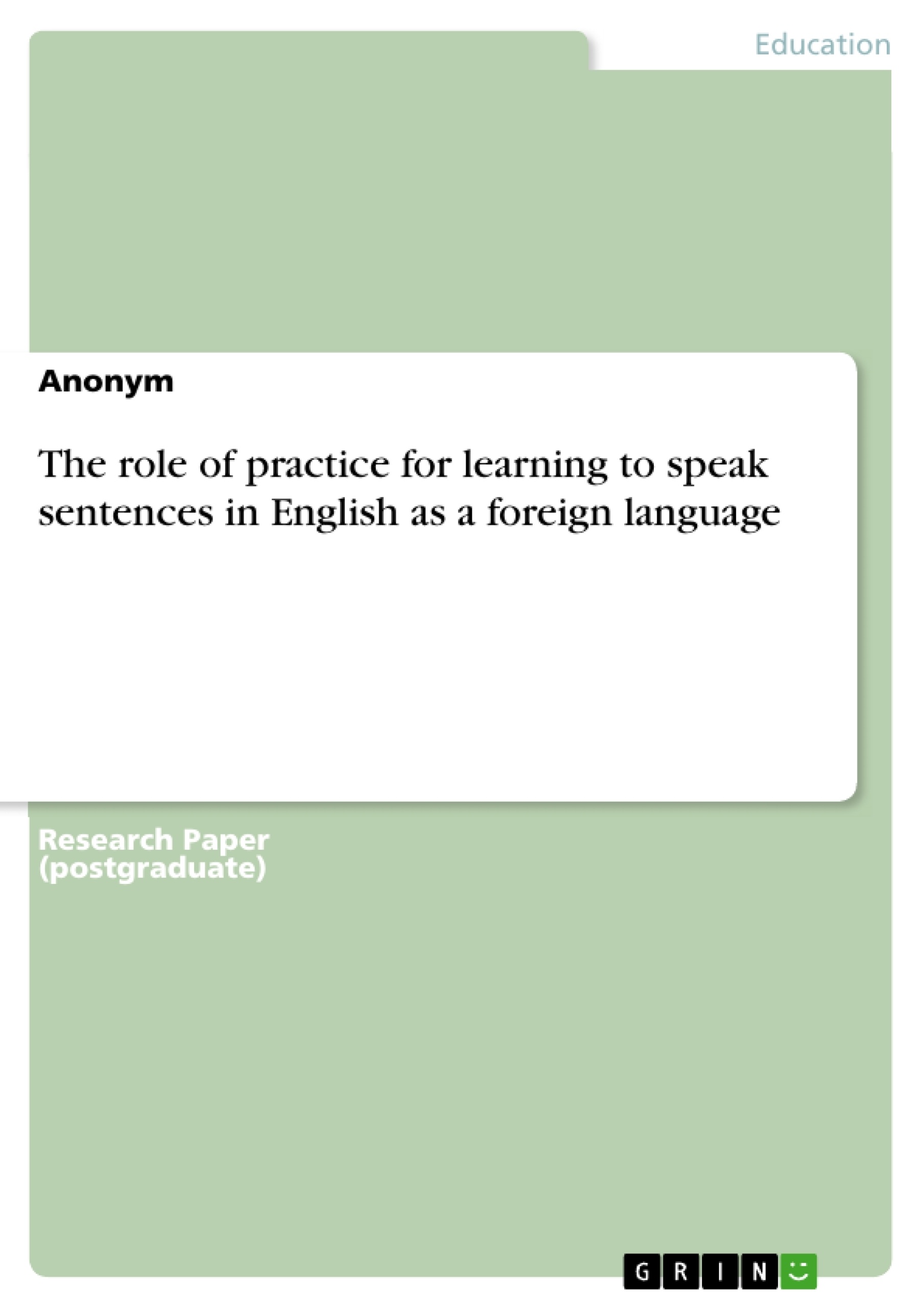Does the warm-up method "Question Time" (as a method of practice) encourage Year 4 learners to speak English in complete sentences during English lessons?
In order to answer the question, a theoretical background on speaking in English lessons will be presented. After the explanation of complete sentences in English, the importance of speaking in the curriculum of English will be explained. Following this, the idea of Warm-ups at the beginning of an English lesson is discussed and the concrete method of "Question-Time" is presented. This method will be tested in the second part of this paper using a year 4 learning group and evaluated on a quantitative and qualitative level. Finally, the study will be critically analyzed and a conclusion will be drawn as to what extent "Question-Time" contributes to the development of the learners' linguistic competencies with regard to the formation of complete sentences.
Besonders zu Beginn des Englisch-Unterrichts in der Grundschule fällt es vielen Schülerinnen und Schülern schwer, sich auf die fremde Sprache einzulassen. Für einige sind die Vokabeln zu schwer, die Grammatik nicht verständlich oder sie haben einfach Angst vor dem selbstständigen und vor allem freien Sprechen. Dabei ist das Sprechen nicht nur ein zentraler Bestandteil des nordrhein-westfälischen Lehrplans für das Fach Englisch, sondern auch eine sehr wichtige Übungsform, um Sicherheit in der fremden Sprache zu gewinnen.
Diese Arbeit konzentriert sich auf die Übungsform des Warm-Ups. Es geht dabei um eine Möglichkeit des regelmäßigen, ritualisierten Unterrichtseinstiegs "Question-Time". Die Schülerinnen und Schüler versuchen hier untereinander auf Englisch ins Gespräch zu kommen und so mehr und mehr das freie und selbstständige Sprechen mit bestimmten Hilfestellungen zu üben.
Diese empirische Arbeit erhebt, inwiefern das freie Sprechen der Schülerinnen und Schüler durch das Warm-Up "Question-Time" im Unterricht gefördert werden kann.
Inhaltsverzeichnis (Table of Contents)
- The challenges of learning to speak in English as a foreign language
- Speaking in English Lessons
- English sentence structure and common mistakes
- Speaking in the curriculum of English lessons in Northrhine-Westphalia
- Warm-up in English lessons at Primary Schools
- Definition and the aim of Warm-ups
- The role of practicing in English lessons
- "Question-Time"
- Description and evaluation of the study
- Description of the learning group
- Implementation of the study
- Description of the evaluation
- Presentation and interpretation of the study results
- Quantitative results
- Qualitative results
Zielsetzung und Themenschwerpunkte (Objectives and Key Themes)
This paper investigates the effectiveness of a warm-up method called "Question-Time" in encouraging Year 4 learners to practice speaking complete sentences in English lessons. The research question explores whether this specific practice method motivates learners to actively participate in English language dialogues.
- Challenges of learning to speak English as a foreign language
- The importance of speaking practice in English lessons
- The role of warm-ups in promoting speaking practice
- The design and implementation of the "Question-Time" method
- Evaluation of the method's effectiveness in promoting complete sentence formation
Zusammenfassung der Kapitel (Chapter Summaries)
Chapter 1 provides an overview of the challenges involved in learning to speak English as a foreign language, particularly focusing on the lack of intrinsic motivation among learners. It highlights the differences between L1 and L2 acquisition, emphasizing the need for motivating methods to encourage speaking practice.
Chapter 2 delves into the significance of speaking in English lessons, particularly focusing on the distinction between monologic and dialogic speaking. It discusses the complexity of dialogic speech and its connection to listening comprehension. The chapter then explores Levelt's model of speech production, emphasizing the challenges of preverbal planning in a foreign language.
Chapter 3 focuses on the concept of warm-ups in English lessons at primary schools, outlining their definition, aims, and role in promoting practice. It then introduces "Question-Time" as a specific warm-up method, highlighting its potential to motivate learners to speak in complete sentences.
Schlüsselwörter (Keywords)
The primary focus of this paper lies on the role of practice in developing the speaking skills of young learners of English. It centers around the concepts of speaking in a foreign language, complete sentence formation, motivational methods, warm-up activities, and the "Question-Time" method. The research specifically explores the application of this method in a Year 4 learning group and its impact on the development of linguistic competencies.
Frequently Asked Questions
What is the "Question Time" warm-up method?
It is a ritualized, regular start to an English lesson where students engage in short English dialogues with each other.
How does "Question Time" help learners speak in complete sentences?
By providing specific prompts and a safe, ritualized environment, it encourages students to practice full sentence structures repeatedly.
Why is speaking a central part of the English curriculum?
Speaking is essential for gaining confidence in a foreign language and is a key competency required by educational standards (e.g., in Northrhine-Westphalia).
What are the main challenges for Year 4 learners in speaking English?
Common challenges include difficult vocabulary, complex grammar, and fear of making mistakes during free speech.
What is Levelt’s model of speech production?
It is a psychological model explaining how thoughts are translated into spoken language, highlighting the difficulty of preverbal planning in a second language.
Does the study provide quantitative or qualitative results?
The study evaluates the effectiveness of the method on both a quantitative and qualitative level based on a Year 4 learning group.
- Quote paper
- Anonym (Author), 2022, The role of practice for learning to speak sentences in English as a foreign language, Munich, GRIN Verlag, https://www.grin.com/document/1372347



